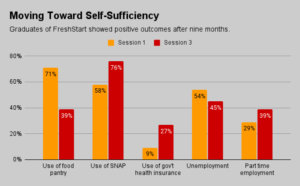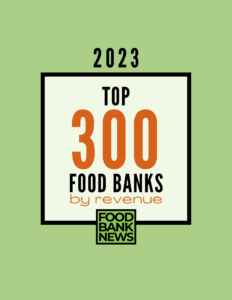Food banks today feel pressure to address root causes of hunger like poverty and inequity, while still solving day-to-day food insecurity. So the question of how non-profits should participate in the food justice movement was a pertinent one, when Suzanne Babb of WhyHunger asked it of two keynote panelists at last week’s Closing the Hunger Gap conference.
In some ways, the solution couldn’t be easier. Food banks do not need to be the leaders in the fight against food injustice. Rather, “see who the leaders are, and support them,” said Karen Washington, a community activist and urban farmer from Bronx, NY.
The Rev. Dr. Liz Theoharis echoed that sentiment, saying non-profits need to ask if they are helping poor people to take action together. “If you are, then we need you at the center of the movement,” said Theoharis, an ordained minister and co-chair of the Poor People’s Campaign.
While food banks can provide support, movements begin and end only with the people most affected by injustice, Theoharis indicated. “Only those in pain know when their pain is relieved,” she said.
Putting poor people in charge may require food banks to change their perspective, Washington said. Food banks will need to examine how they view poor people, she said, adding, “You must define them as being powerful, not powerless.”
It needn’t take much to begin to put disadvantaged people at the forefront, according to the panelists of another conference session. Jackie Bogart, an AmeriCorps VISTA with the Food Bank of the Southern Tier, said she found her voice and became empowered as a graduate of the food bank’s speakers bureau program, which trains people with lived experience to share their stories.
Since then, Bogart has become an advocate for social change and spoken to a number of audiences, including the Poor People’s Campaign Mass Meeting and on a panel at the Anti-Hunger Policy Conference in DC. “I’ve been able to do all that I do because I’ve been lifted up,” she said. “Before, I didn’t know I had any power. But once you’ve been shown you can make a difference, that just multiplies.”
One trick to getting new voices involved in food justice is to meet marginalized people where they’re at. FoodShare of Toronto, which delivers produce to more than 45 farmer’s markets throughout the city, makes a point of helping community organizers find easily accessible places for the markets, such as the lobbies of residential buildings.
Discussions too need to happen at places that are easy and familiar. “Picnic tables are the point of entry,” noted Andrew Antonio, FoodShare’s Good Food Market Facilitator, “because walls and doors are huge barriers.” People shouldn’t need to be heroic to make contributions, he added. “If they need to be courageous, then we’re not making it comfortable,” he said.
Over time, with proximity and trust, “then small nets of community start to emerge,” Antonio said.
The idea of cooperatives as an effective tool for redistributing power emerged during one of the conference’s Day 2 panels. Erin Byrd is the Board Chair of Raleigh-based Fertile Ground Food Cooperative, a grocery store with more than 370 community owners that seeks to provide access to affordable and healthy food. Byrd expressed her passion for the power of cooperatives to create an underground economy that “works for the people, not the system.”
In the final keynote of the conference, Janet Poppendieck, Senior Faculty Fellow at CUNY Urban Food Policy Institute, took up the idea of cooperatives, noting that food banks may be at a point of inflection, now that the fight against food insecurity has shifted from being an emergency response, to being an ongoing, fully normalized effort. As part of a coming possible “insurrection” or backlash against the current charitable food system, Poppendieck speculated whether food banks might shift to become supply hubs for cooperatives, rather than just for traditional food pantries.
ABOVE: Rev. Dr. Liz Theoharis, left, and Karen Washington at the Closing the Hunger Gap conference.









